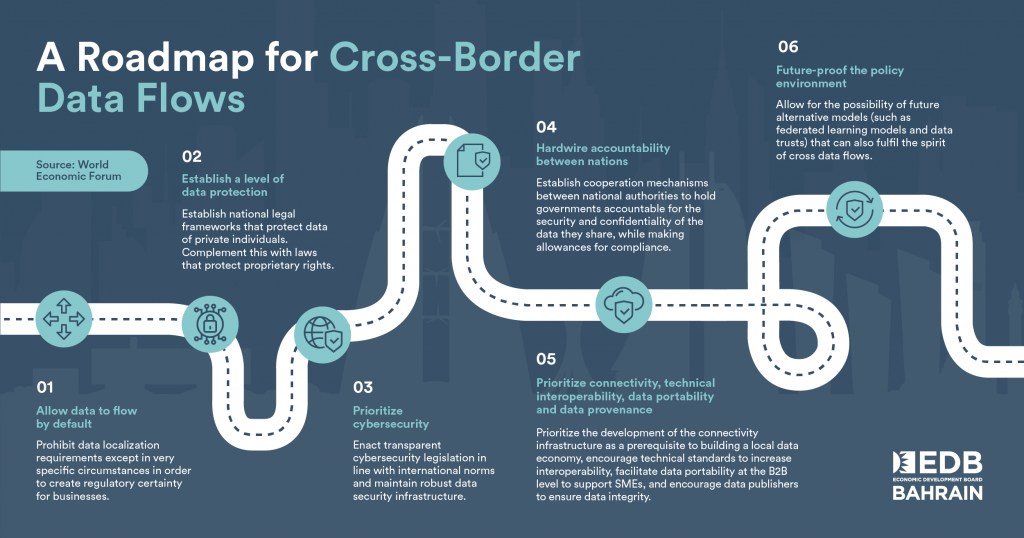Earlier in the summer, Bahrain partnered with the World Economic Forum to launch a new Roadmap for Cross-Border Data Flows – a regulatory framework providing the building blocks for major economies across the globe to roll out compatible systems that drive tech-based collaboration.
Restrictive data policies risk causing damage to data-reliant technologies such as AI and blockchain, which are an essential part of Bahrain’s approach to digitising the economy. These systems power everything from faster customs processing on the King Fahd Causeway to customer authentication in the financial services sector as well as a range of other critical infrastructure technologies.
The importance of such a framework has been emphasised by the ongoing COVID-19 pandemic, which is acting as a catalyst for increased digitisation around the world. Major economies are seeing huge strides in remote working and education, on-demand shopping, virtual events and the shift to the cloud – a major shift in the digital landscape. But – as the crisis highlights a new need for digital frameworks specifically built for the needs of a home-based global population – change requires leadership, and Gulf countries have an opportunity to move out in front.
The Gulf’s data-driven response to COVID-19
In the earliest days of the COVID-19 crisis, the Gulf showed its ability to quickly roll out data-driven solutions due to its world-class infrastructure. According to research by Ookla’s Global Speed Test Index, Saudi Arabia and the UAE enjoy some of the fastest mobile broadband speeds in the world – powering workers and students to log on remotely – while Bahrain hosts the region’s first hyper-scale data centre, something that has been essential for digital businesses across the GCC in catering to an influx of customers. The Kingdom was also one of the first in MENA to roll out super-fast, low-latency commercial 5G networks, with the service predicted to reach 80 million subscriptions in the region by 2025.
This critical infrastructure powers the data-driven technologies which allow for regional economies to meet the needs of quarantined populations. Governments have also been able to derive new insights and solve big challenges – for example the use of mobility data to track case upsurges and activity in different regions as the pandemic has progressed.
Next steps for the region
Having demonstrated the value of tech policy during a time of exceptional challenge, the right legislative frameworks are needed to unleash the international data economy. Moreover, these frameworks need to be interoperable so that nations and regions can streamline requirements across borders and create mechanisms to reduce regulatory overload.
Doing so capitalises on economies of scale, particularly at regional level, and allows governments to create a friendly policy environment for indigenous and international investment while moving towards the Fourth Industrial Revolution in a post-COVID era.
Building the foundations of a data-first economy
The new WEF Roadmap, produced in collaboration with the Bahrain Economic Development Board, includes country-level policy building blocks designed to harness the benefits and minimise the risks of cross border data sharing. For some countries, such as Bahrain, only small upgrades will be necessary whereas for others the framework may represent a full-suite starting point. By following the recommendations, policymakers can build best-practice legislations and harness the economic and social benefits of data-reliant technologies.
Bahrain has already put in place robust measures to ensure the protection of data – something that is often considered a firm’s greatest and most valuable asset. The Personal Data Protection Law is a key enabler in the development and future growth of the country’s digital economy. By recognising the importance of data protection, the law seeks to keep pace with technological advancement by promoting efficient, secure and effective processing of big data. But now, greater collaboration is needed on an international scale to protect and secure the free movement of information outside individual country borders.
Driving digital development
Bahrain’s interest in the project stems from the recent introduction of national policy frameworks to facilitate data flow across borders and improve overall soft infrastructure, including the introduction of a data jurisdiction law allowing foreign governments to maintain their jurisdictions over data stored in Bahrain-based data centres.
Speaking at the launch, H.E. Kamal Ahmed, Bahrain’s Minister of Transportation and Telecommunications, called for greater collaboration between regional governments on cross-border data flows. He said: “The free flow of data is critical for Bahrain and the wider GCC. Not only can it empower the region and enable it to compete in the Fourth Industrial Revolution, but the proliferation of new technologies enhances our competitiveness and ability to attract innovation.”
Following the launch of the WEF Roadmap, the GCC region now has a real opportunity to encourage data collaboration in a safe and trustworthy manner. In a post-COVID era, open digital borders will be a strength rather than a weakness, and are indispensable to our collective recovery.




